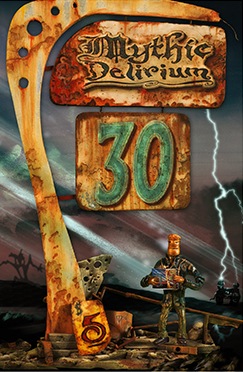Since it happens to be poetry month, the time seems more or less just right for talking about the transitional last print issue of long-running speculative poetry magazine Mythic Delirium. It’s issue #30, and in honor the magazine’s Kickstarter funded shift to digital publication and a new format, editor Mike Allen had gathered up a retrospective from the past fifteen years’ worth of issues—poems ranging from the first from their first issue, to the most recent MD poem to win a Rhysling Award.
It is an interesting sort of project, a goodbye to the old and a remembrance of the past that also happens to be signaling a fresh start for the magazine, with different guiding principles and a radically different format. I look forward to seeing what the Allens (Mike and Anita) do with the upcoming magazine, but for now, there’s the retrospective issue and the poems in it.
Though not a devoted reader of the speculative poetry field, I do quite like poetry in general—so I tend to try, especially in April, to cover a bit of it that’s relevant to this corner of genre. The release of this last issue of Mythic Delirium seemed rather serendipitous, and also presented me, a reader who hasn’t followed the magazine over the years, a chance to get a good look back at what has been published in it over time.
The first handful of poems in the issue are all immensely self-conscious, sometimes to their detriment. I found it difficult to be engaged with them, in their whimsy and attempts to render textuality and the worlds of story into one big fun web—it’s just something I’ve seen and seen a thousand times, so it has to be done with a little bit more panache and fire than these poems have on offer. Instead of drawing the reader in and weaving an affective experience of their intertextual fancies, these poems seem to push the reader away, drawing attention to their conceit, their concept, rather than language or the experience of it.
This changes once we get to Amal El-Mohtar’s “Song for an Ancient City,” which is the first of the pieces that stands steady and evocative on its own two legs—it certainly does not feel like a conceit, or a paint-by-numbers sort of poem about stories. Instead, El-Mohtar’s work here is rhythmic and lyrical, invested with a depth of affect that revolves around the poetic image of an ancient city’s dust as more precious and significant than jewels. The closing stanza, exploring the city as a woman who might be identical to the speaker, is simultaneously erotic and familial; it’s got echoes of the mythic genius loci. Solid stuff.
Sonya Taaffe also makes a strong showing in this collection, with poems like “Sedna.” The language of this short poem is intense, repetitious in the clever artful way that makes each looping strain feel more and more powerful. The use of breath and caesura in the piece also creates several hard stops that add to the growing pressure of the immense imagery and mythic echoes Taaffe is constructing, and I appreciated that distinctly poetic set of techniques. Too often, one sees a poem that reads like a sentence chopped up—no danger of that, here.
I wanted to like “Bal Macabre” by Theodora Goss more, as it’s one of the few pieces in the retrospective to employ a formal pattern and rhyme scheme—and formal can be good! But I’m afraid that it didn’t quite come to life for me, didn’t render the anthropomorphized figures of Death or War or Beauty as anything more than ideas that have been hashed out elsewhere, otherwise. It didn’t feel fresh.
The last handful of poems are all science fictional, or more accurately, they are concerned with space. Most of these pieces suffer from the same problem: they read like prose or a few lines from a journal entry—personal, sure, and even containing emotion—but they don’t have much in the way or artisanship or poetic structure. Of the bunch, the strongest was perhaps Jennifer Crow’s “We Took Our Gods,” which does have a bit of formal structure to it in the repeating first lines. It also deals with the emotional and psychological implications of humans entering space, the nature of what we must take with us when we do so. I’m not sure I entirely agree that we’d leave the soft or domestic gods behind—they’re got their place—but it’s interesting, and has good use of language.
One extra point: the inclusion of illustrations is great, and a part of issue #30 that I quite enjoyed. They’re handsome, usually in the cut-out style, and give a nice black-and-white visual resonance to the poems they’re paired with. It’ll be interesting to see if the tendency toward illustration continues in the magazine’s new, digital form; I do hope so.
Overall, I would suggest this is not the strongest collection of poems—though it is, standing as a retrospective, a revealing and interesting last issue of a long-running publication that has had its ups and downs. While I did enjoy several of the poems, Mythic Delirium #30 ultimately felt as if its urge to cover so much ground in reprinting work from the past fifteen years had unbalanced its quality somewhat. It also might be an indication of the room for growth and experiment still available for poets writing speculative work. In the end, though, this issue is perhaps more a pleasure for the existing readership of the publication than for an unfamiliar eye and a casual encounter.
Mythic Delirium #30 is available now from Mythic Delirium Books.
You can subscribe to the upcoming digital format here.
Lee Mandelo is a writer, critic, and editor whose primary fields of interest are speculative fiction and queer literature, especially when the two coincide. She can be found on Twitter or her website.










